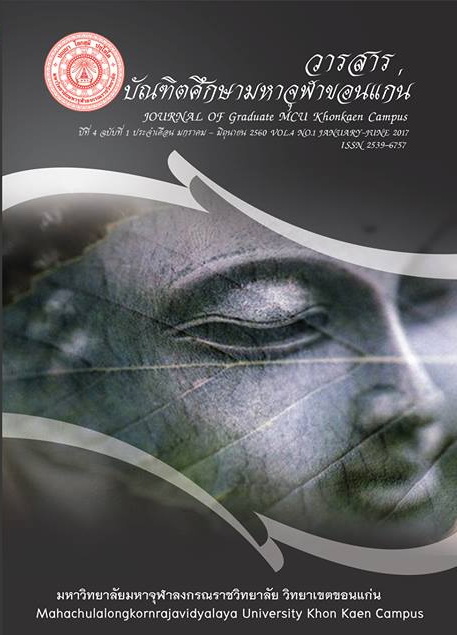วิชาชีพการเงินการบัญชีในวิถีทางพระพุทธศาสนา
Main Article Content
Abstract
วิชาชีพการเงินและการบัญชีเป็นอาชีพที่ไม่โดดเด่นมากนัก แต่เป็นอาชีพที่ขาดไม่ได้ในทุกหน่วยงาน เป็นวิชาชีพที่มีระเบียบแบบแผน มีกฎ กติกา ข้อบังคับ มีจรรยาบรรณของวิชาชีพ ที่ระบุไว้เป็นรายลักษณ์อักษรรองรับทางกฎหมายอย่างชัดเจน การทำหน้าที่การเงินการบัญชี ต้องมีหลักคุณธรรมจริยธรรมทางพระพุทธศาสนานำมาประพฤติปฏิบัติ ควบคู่กับจรรยาบรรณวิชาชีพ หลักจรรยาบรรณของวิชาชีพการเงินการบัญชี ยึดหลัก 4 ประการ คือ 1. มีความซื่อสัตย์ สุจริต 2. มีความละเอียดรอบคอบ 3. รักษาความลับทางด้านบัญชีของหน่วยงานและบุคคลที่เกี่ยวข้อง 4. ไม่นำเอกสารทางด้านบัญชีไปเผยแพร่ต่อบุคคลภายนอกโดยไม่ได้รับอนุญาต หลักพุทธธรรมทางพุทธศาสนาที่นักการเงินการบัญชีต้องศึกษานำมาปฏิบัติ เพื่อเกื้อหนุนส่งเสริมทำให้เกิดผลสัมฤทธิ์แห่งหลักการทั้ง 4 ประการ ประกอบด้วย สุจริต 3 อย่าง ,ธรรมที่มีอุปการะ, อิทธิบาท 4,ฆราวาสธรรม4, หิริ โอตัปปะ การประกอบอาชีพเงินการบัญชี เป็นการควบคุม ดูแล ตรวจสอบ และรายงานฐานะทางการเงิน รายละเอียดอื่นๆทางด้านเอกสารขององค์กร เป็นผู้ทีมีความรู้ ทักษะ ความสามารถเฉพาะทาง เป็นผู้ที่มีความซื่อสัตย์ สุจริต รักษาไว้จรรยาบรรณของนักบัญชีอย่างเที่ยงตรง พัฒนาตนเองและองค์กรให้เจริญกล่าวหน้า ด้วยปฏิบัติตนเป็นผู้ปิดทองหลังพระได้เป็นองค์พระโดยสมบูรณ์และสวยงาม จึงเสมอเหมือนนักการเงินการบัญชีผู้อยู่เบื้องหลังแห่งความสำเร็จขององค์กร
Financial and accountant vocation was not that interesting occupation. It, however, was in every organization in which it was a profession with plans and regulations as well as vocational ethics that was designated by written notice supported in accordance with the law. To be responsible in finance and accountancy needed to have Buddhist principles to perform with vocational ethics. The ethics of finance and accountancy hold four aspects: 1) be honest, 2) be careful, 3) be responsible for the confidentiality of organizational finance and involving people, and 4) do not distribute the financial documents to others without the permission. The Buddhist principles that finance and accounting officer should follow in order to support the effectiveness of the mentioned aspects above included the following: three honesties, supportive Dhamma, Four Iddhipāda, Four Gharavasadhamma, and Hiriottappa. Financial and accountant vocation was a supervision, check, and report of the financial status. In addition, in other details of organizational document, the officer was the one who was knowledgeable, skillful, and honest, had specific ability, and kept up accurately the ethics of finance officer as well as developed oneself and organization progressively by behaving completely and perfectly as doing good things without announcing them to the world.

